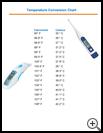
Fever
________________________________________________________________________
KEY POINTS
- Fever is when your body temperature is higher than normal.
- Treatment may include nonprescription medicine to lower your temperature, rest, drinking lots of liquid, and not bundling in blankets.
- You may need to see your provider if you have other symptoms, or if you are not getting better after a few days.
________________________________________________________________________
What is a fever?
Fever is a body temperature that is 1 or more degrees higher than your normal temperature.
Normal body temperature varies from person to person. An oral temperature of 97 to 99 degrees F, or 36.1 to 37.2 degrees C, is usually considered normal. Normal temperature also varies with:
- Age
- The time of day
- The part of the body where it’s measured
Exercise, medicine, and even excitement are other things that can affect your temperature.
Different types of thermometers are available to measure your temperature in different parts of your body. For example, there are thermometers that measure temperature in the mouth, ear, armpit, or rectum or on the forehead. Temperatures measured in the different areas may be different by one half to 1 degree.
What causes fever?
A fever is a symptom, not a disease. It can be a sign that your body is fighting an infection, like an ear infection or the flu. A fever can also be a symptom of other medical problems, and most often you will have other symptoms, too. Sometimes the cause of a fever may not be known.
How is it treated?
- Not all fevers mean you need to see your healthcare provider for treatment. You may treat your fever at home if you have no other symptoms such as serious headache, chest pain, abdominal pain, cough, or rash.
- You can take nonprescription medicine, such as acetaminophen, ibuprofen, naproxen, or aspirin, to lower your temperature. Take medicine according to the directions on the package or follow your provider's instructions. You may need to take more than 1 dose before you get relief. Unless recommended by your healthcare provider, you should not take these medicines for more than 10 days.
- Nonsteroidal anti-inflammatory medicines (NSAIDs), such as ibuprofen, naproxen, and aspirin, may cause stomach bleeding and other problems. These risks increase with age.
- Acetaminophen may cause liver damage or other problems. Unless recommended by your provider, don't take more than 3000 milligrams (mg) in 24 hours. To make sure you don’t take too much, check other medicines you take to see if they also contain acetaminophen. Ask your provider if you need to avoid drinking alcohol while taking this medicine.
If you have asthma, ask your healthcare provider if it’s OK to take an NSAID.
Medicines usually start to lower your fever in 1 to 2 hours. Check your temperature to see if the medicine is working. You may need to keep taking the medicine according to the directions until the illness runs its course.
Keep track of your doses of medicine. Write down the name of the medicine and when you took each dose. This is especially important if you are taking more than 1 medicine.
How can I take care of myself?
Here are some other things you can do to help yourself feel better when you have a fever:
- Get plenty of rest.
- Drink lots of fluids, especially water, unless you are told to limit fluids.
- Dress in light, comfortable clothing. Don’t bundle in blankets.
- Keep the room cool but not uncomfortably cold.
- Bathe or sponge yourself with lukewarm water.
Call your healthcare provider if:
- Your symptoms are getting worse even though you are taking medicine to lower your fever
- You have serious symptoms in addition to the fever, such as severe pain (headache, chest pain, or abdominal pain) or a rash
- You have symptoms that make it hard to treat the fever, like vomiting that makes it hard to keep medicine or fluids down
- You keep having symptoms for more than 1 or 2 days, or you are not getting better after a few days

